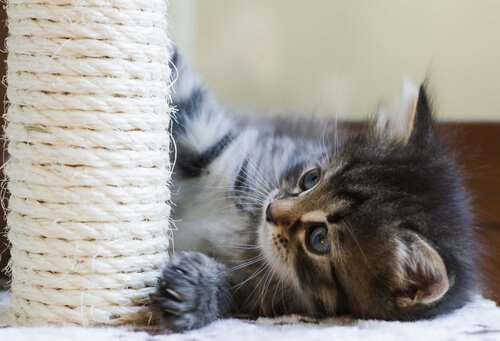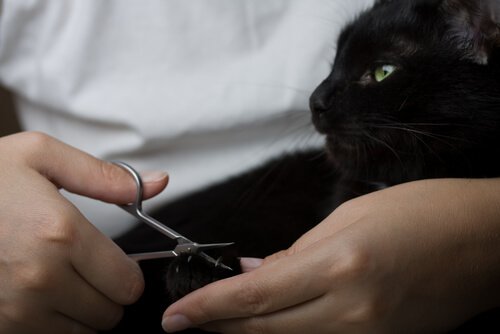How Do Your Cat's Scary Claws Work?


Written and verified by the lawyer Francisco María García
If there’s ever a problem of having a cat at home, it usually has to do with the cat’s claws. It’s essential for cats to keep their claws sharp, and they sharpen them by scratching up furniture. However, instead of spending a lot of money on repairing furniture, cat owners can offer their pet other attractive options.
Cats use their claws a lot, especially for scratching and climbing. They can be used for self-defense against outside threats. Also, cats even stretch their body when scratching on the surface of something.
When it comes to your cat’s claw, the ideal thing to do is to provide them with a place where they can use them without causing any damage. For example, a climbing toy, an old piece of furniture, or a bed that you no longer use.
Cat’s claws
Although cats use their claws mainly for hunting and self-defense, they also use them for other things. They help them with balance and mobility. They also use them to mark their territory during their first months of life.
Cats also use their nails to relieve their stress. An anxious feline will continuously scratch a piece of furniture or a toy. This can a way they communicate their stress to their owner, which is why you should try to figure out why they are behaving in this way.
In some countries, declawing cats is a normal practice. There are many people who are against this procedure because they see it as a mutilation of the animal that may cause the cat to have problems later on in life, such as walking, muscle atrophy, and depression.

How to avoid damage caused by your cat’s claws
1. Keep their claws well cut. This simple habit is very practical and easy to do. Not only is it good for their hygiene, but it will help you avoid any damage to your furniture.
2. Teach them to scratch the same places and toys. Scratching and climbing toys are perfect for felines to use their claws on. There are many different types: climbing, hooking and scratching.
3. Cover your furniture with protectors. Although it may not be the most eye-appealing option, it’s helpful when it comes to protecting your furniture. It’s important that you buy a durable protector: plastic is better than cloth.
4. Use repellents or water. Some owners choose to use spray bottles of water to scare their cats; there are also repellents with unpleasant odors or ones that neutralize their smell. However, this application has to be done constantly in order for it to work.
5. Keep them marking their territory. Cats mark their territory by rubbing their neck or face into specific areas. Cats secrete oils from these parts of their bodies in order to leave an odor on their territory or belongings. A good trick to keep them from marking an area in your home is to rub your furniture with a product that’s unpleasant for cats.

Caring for cat’s claws
- Trimming their claws. Some owners have the courage to trim their cat’s nails. If you decide to do this, it’s important to remember that you need the right nail clippers. You shouldn’t cut any deeper than the interval vein because this will be very painful for your pet.
- Keeping their paws hydrated. There’s a lot of creams at the store made to moisturize your dogs’ and cats’ paws. It’s important to keep them from getting dry and to avoid any injuries associated with dryness. This is especially true for cats because they tend to climb on things.
- Watch their nutrition. Just like with humans, correct nutrition influences the growth and strength of their nails.
- Special cat food has the nutrients they need to keep your cat’s fur and nails in good condition. It’s always best to give them this type of food unless you have knowledge of complementary diets.
- Use plastic covers on their claws. One option that is becoming more popular is plastic claws. They’re flexible plastic liners that go over the nails. This allows the animal to scratch without them damaging anything around the house.
If there’s ever a problem of having a cat at home, it usually has to do with the cat’s claws. It’s essential for cats to keep their claws sharp, and they sharpen them by scratching up furniture. However, instead of spending a lot of money on repairing furniture, cat owners can offer their pet other attractive options.
Cats use their claws a lot, especially for scratching and climbing. They can be used for self-defense against outside threats. Also, cats even stretch their body when scratching on the surface of something.
When it comes to your cat’s claw, the ideal thing to do is to provide them with a place where they can use them without causing any damage. For example, a climbing toy, an old piece of furniture, or a bed that you no longer use.
Cat’s claws
Although cats use their claws mainly for hunting and self-defense, they also use them for other things. They help them with balance and mobility. They also use them to mark their territory during their first months of life.
Cats also use their nails to relieve their stress. An anxious feline will continuously scratch a piece of furniture or a toy. This can a way they communicate their stress to their owner, which is why you should try to figure out why they are behaving in this way.
In some countries, declawing cats is a normal practice. There are many people who are against this procedure because they see it as a mutilation of the animal that may cause the cat to have problems later on in life, such as walking, muscle atrophy, and depression.

How to avoid damage caused by your cat’s claws
1. Keep their claws well cut. This simple habit is very practical and easy to do. Not only is it good for their hygiene, but it will help you avoid any damage to your furniture.
2. Teach them to scratch the same places and toys. Scratching and climbing toys are perfect for felines to use their claws on. There are many different types: climbing, hooking and scratching.
3. Cover your furniture with protectors. Although it may not be the most eye-appealing option, it’s helpful when it comes to protecting your furniture. It’s important that you buy a durable protector: plastic is better than cloth.
4. Use repellents or water. Some owners choose to use spray bottles of water to scare their cats; there are also repellents with unpleasant odors or ones that neutralize their smell. However, this application has to be done constantly in order for it to work.
5. Keep them marking their territory. Cats mark their territory by rubbing their neck or face into specific areas. Cats secrete oils from these parts of their bodies in order to leave an odor on their territory or belongings. A good trick to keep them from marking an area in your home is to rub your furniture with a product that’s unpleasant for cats.

Caring for cat’s claws
- Trimming their claws. Some owners have the courage to trim their cat’s nails. If you decide to do this, it’s important to remember that you need the right nail clippers. You shouldn’t cut any deeper than the interval vein because this will be very painful for your pet.
- Keeping their paws hydrated. There’s a lot of creams at the store made to moisturize your dogs’ and cats’ paws. It’s important to keep them from getting dry and to avoid any injuries associated with dryness. This is especially true for cats because they tend to climb on things.
- Watch their nutrition. Just like with humans, correct nutrition influences the growth and strength of their nails.
- Special cat food has the nutrients they need to keep your cat’s fur and nails in good condition. It’s always best to give them this type of food unless you have knowledge of complementary diets.
- Use plastic covers on their claws. One option that is becoming more popular is plastic claws. They’re flexible plastic liners that go over the nails. This allows the animal to scratch without them damaging anything around the house.
This text is provided for informational purposes only and does not replace consultation with a professional. If in doubt, consult your specialist.








